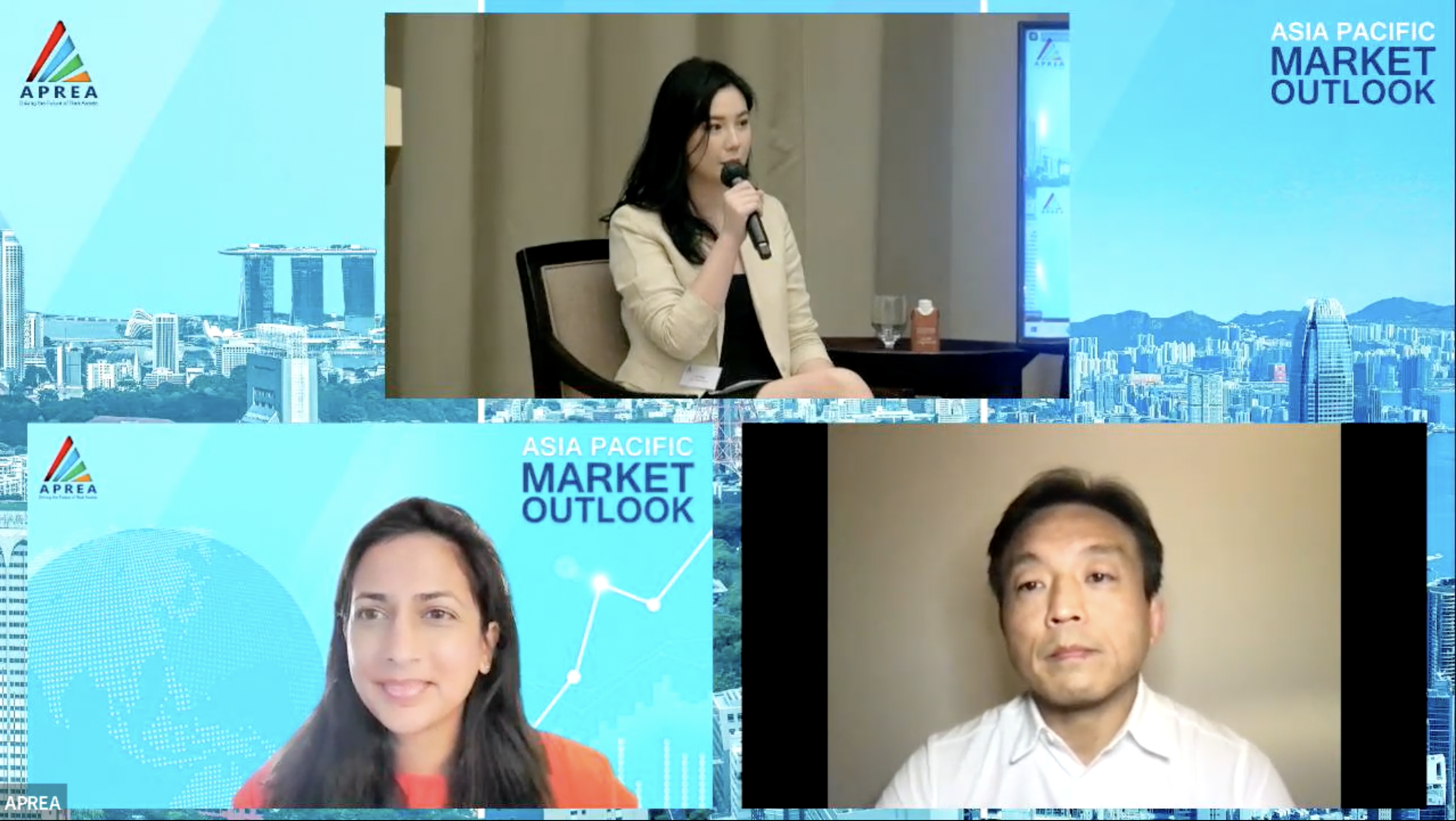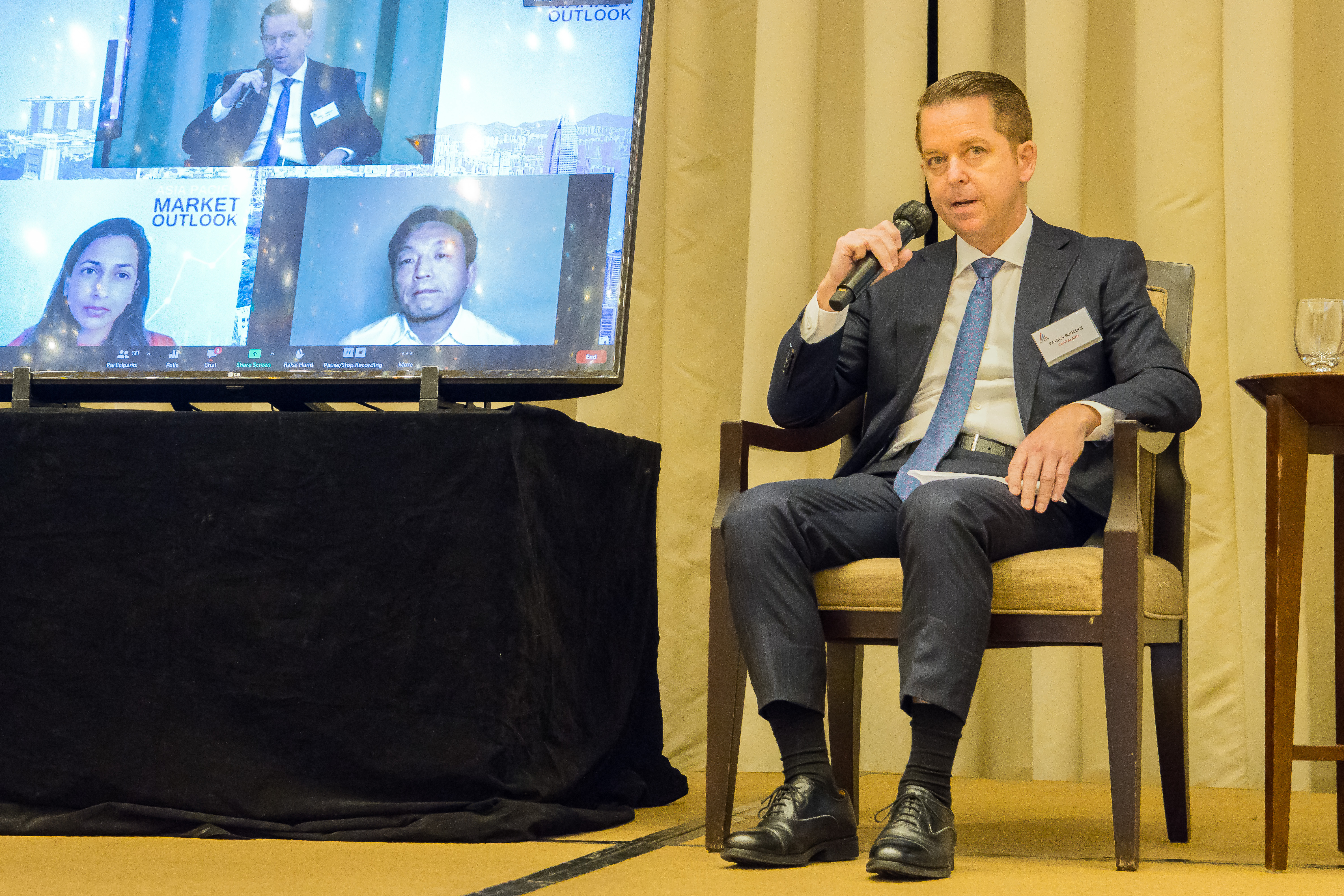The Age of Alternatives 27 April 2022

A megatrend that emerged from the last decade and continues to gain momentum is the pivot by investors to non-traditional forms of real estate. The onset of the pandemic has notably accelerated the focus on new economy assets, including those that provide vital infrastructure to the digital economy, such as data centers and logistics. Another powerful trend is the move towards ESG initiatives.
APREA took the opportunity to convene a panel of experts during the association’s annual Asia Pacific Market Outlook 2022 conference to explore how investors are leveraging on these shifts in their investments.
The World is Data Hungry
The increased digitalization of the global economy, driven by the rapid adoption of technologies such as cloud computing and data analytics, has increased the importance of data where it can be considered the lifeblood of the modern global economy. According to Equinix, Asia Pacific could generate up to 6,000 terabits of data per second by the middle of the decade. This will continue to drive demand for the vital pieces of infrastructure that facilitates this – data centers.
All three panelists agreed that data centers will continue to be built across the region. Patrick Boocock, Chief Executive Officer, Private Equity Alternative Assets, Real Assets at CapitaLand Investment, said “We purchased a portfolio of data centers in Europe and China, and we are currently developing two data centers in Korea. We have people looking at assets in every market as part of growing a broader data center platform as we see increasing demand for data in both developed markets and developing markets.” However, Ivy Min, Account Director, Alternative Investments at SS& C Intralinks, who moderated the discussion noted that investments have so far mainly been concentrated in the developed markets.
One reason for this is that, given the higher risks a developer would have to assume in growth markets, it is easier to build scale in the developed markets, said Tak Murata, Co-head of Asia Pacific Private Investing, Head of Asia Pacific Real Estate at Goldman Sachs Asset Management.
Another reason is that there remain significant opportunities in developed markets where supply continue to lag demand. Greater Tokyo, for example, is the world’s second-largest data center market after North Virginia, he added. Ambika Goel, a Managing Director in Blackstone’s Real Estate Group, agreed as she noted that even in Japan, the per capita supply of data centers is 60% below comparable cities.
Prospects in the emerging markets are also promising as there remains significant capacity headroom. Ambika noted that in India, there are about 500 megawatts of deployed data center capacity which is similar to the city of Las Vegas.
“It’s a function of underlying demand and in developing markets where you have a rising middle classes, everyone’s got a mobile phone and potentially a tablet, of course, the need for data centers is going to increase,” Patrick agreed.

More Structured Approach to ESG Agenda
With investors ploughing increasingly more funds into ESG-compliant investments, it is only right that they get what they are paying for. And it is not just about the environment. According to Bain & Co, the measurable impact of ESG will evolve to have a similar level of importance to financial return and risk. However, differing standards and regulations continue to present challenges
Ambika reveals that Blackstone has a structured approach to upholding transparency to investors and stakeholders. The firm, for example, has partnered with Schneider Electric to track its utility spend and carbon footprint, which is “definitely industry-leading”.
Patrick agreed as he noted that the view of investors is critical of what managers are doing to quantify, understand and address ESG issues on their assets. Now there’s far more discipline going into understanding and analyzing ESG implications on real assets, whether its infrastructure or real estate.
“Going forward, we are going to start seeing lots more robust Capex plans for the future to reduce the carbon footprint on the built environment,” he said.
Tak reminded that whilst the Environment component is important, the Social and Governance aspects also need to be addressed. These considerations are necessary to evoke change as the ESG the footprint of a company could reverberate beyond its corporate walls and extends across a company’s value chain as well as its various stakeholders.
“The impact that real estate properties have on the community is something that we think about and measure and try to implement,” he said.
.
Net Zero a Major Investment Driver
As evidence mounts globally on the effects of climate change, investors in recent years are voluntarily embracing targets to reach net-zero emissions on their assets. Ivy noted that this could introduce investment opportunities for asset managers.
“We’re entering an interesting time across real estate and infrastructure. The world is committed to transitioning to net zero. Assets that are not part of the transition face the risk of obsolescence. CapitaLand Investment is looking at opportunities in renewables and continuing to feed and increase the use of renewable energy from our projects into our logistics and business parks,” Patrick said.
Ambika observed that in the US, occupiers are making the move into more multi-tenanted data centers to focus on access to renewables. She revealed that Blackstone’s data center platform in the US is looking to procure 100% of its power from renewable sources and looking to get green\ certification for 90% of the QTS portfolio, which the firm acquired last year.
All three panelists agreed that massive amounts of investments will be needed to transition the global economy to net zero, with close to US$10 trillion in the next decade; Ambika estimated that close to US$100 trillion is needed to power this to the middle of the century.
However, Tak opined that importantly is where such massive spending will be channeled into. He believes that some of these have to be made in more cutting-edge technologies to put the world through an energy shift, such as hydrogen fuels, to reverse climate change. That means taking more risks on projects. However, he is hopeful that the wave of investments could make such developments more viable.
“That’s another opportunity, where capital that is less financially driven could bring interesting ways to backstop some of these technologies and get it going. It’ll be interesting for us as alternative managers to put these together to bring the next energy shift to the world,” he said

Alternatives – A Good Hedge
Even as the world continues to forge a path toward endemic living and risks from the pandemic subsides, 2022 has opened with renewed threats, first from inflationary pressures and most recently, the Russian incursion into Ukraine. This weakens the economic recovery from the pandemic and heightens stagflation risks.
“This is just going to continually boost some of the current trends,” said Ambika, as she pointed out that the merits of investing in alternatives will be reinforced. She cited that just as what had occurred during the pandemic, the case for supply chain resilience will gain further traction.
“What’s happening globally is that we have to think about having more supply chain shocks in the future; Covid has seen that and I think the situation over Ukraine is another reminder,” she elaborated.
She revealed that Blackstone has committed over US$54 billion of equity to thematic investments, with about 70% of its portfolio in logistics, residential, and life sciences. Aside from these, Blackstone is also betting on the content creation industry. Last year, the firm acquired the Eclipse (formerly known as the Sandcrawler) building in Singapore, which counts Disney and Lucasfilm as tenants.
“This is where growth is far outpacing inflation and we think inflation is something to keep an eye on and we’re watching that as we make our investments,” she pointed out.
Tak agreed as he believes oil price volatility also heightens the case for and accelerates the move to renewables even further. Real estate will also continue to shine in the current environment given new economic trends and the abundance of capital.
“Real estate in terms of an inflation environment is a very interesting asset class; it gives you a bit more equity-like return but still maintains some fixed income-like nature as well,” he elaborated.


